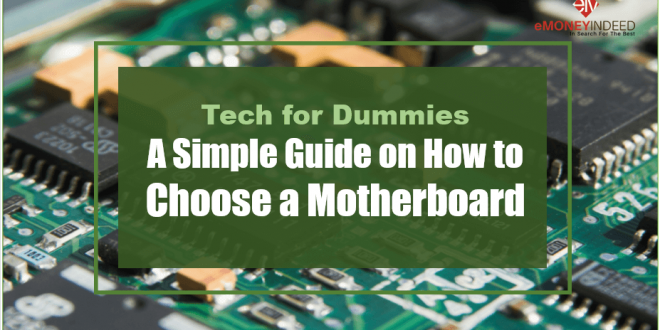
Easy Guide on How to Choose a Motherboard
When you decide to repair or build
your own PC, there are multiple components you have to choose. However, the
most important component of a PC is the motherboard.
A motherboard is a printed
circuit board (PCB) that provides connectivity and also facilitates
communication between the different components. Every component you use whether
a graphics cards, a storage drive or a CPU will get connected to the
motherboard.
Read – How Technology Can Help Your Small Business
Unfortunately, most people who are
not accustomed to PC rebuilding and repair do not know how to choose a
motherboard. As a result, they choose a motherboard that can’t support the
components they wish to use.
If you are new to computers and
don’t know how to choose the best motherboard for your needs, you have come to
the right place. We have provided a simple yet elaborate guide on how to go
about choosing a motherboard.
To learn more keep reading.
What
Factors Should You Consider When Choosing a Motherboard
Whether you are repairing or
building a custom PC, your choice of motherboard relies on a number of factors.
There are multiple factors to consider but we will focus on the key ones since
this is a simple guide for beginners.
The main factors to consider are as
follows.
#1.
CPU Platform
A CPU is the central
processing unit but commonly referred to as the processor.
Typically, you can only choose one of two brands of processors. Those made by
Intel or those manufactured by AMD.
All motherboards come with
pre-designed sockets for either Intel or AMD. However, just because a
motherboard has an Intel chip slot, it doesn’t mean it can support all Intel
chipsets. Hence, depending on the kind of processor you want to use, you have
to ensure the motherboard you select can handle it.
For instance, if you want to use a powerful chipset like the Intel i7 9700k you want to take a look at a guide for i7 9700k motherboards to ensure you make the right choice.
You can also use this guide on how to check if a motherboard is compatible with your choice of CPU.
In a nutshell, a processor is the
brain of the computer. The processor you decide on typically depends on
your PC needs. If you would like a processor that can facilitate applications
that use multiple cores then AMD is your best bet. Nonetheless, if you need a
fast performance single-core processor then Intel is your best option.
#2.
Form Factor
Form factor represents the size of
the motherboards. The size of the motherboard typically determines how many
sockets/slots you get for components. Additionally, the motherboard has to fit
into the PC case you have.
As far as form factor get concerned, there are three sizes of motherboards to choose from. The sizes are:
The ATX is the largest and
considered the standard size motherboard. The MicroATX and Mini-ITX are the
medium and smallest sizes respectively.
When it comes to choosing the size
of a motherboard, there are numerous factors to consider such as:
- The size of the PC you want to build or repair
- How many component slots you need at the moment as well
as in the future
It is essential to note that the ATX
form factor has the greatest number of slots as well as expansion capabilities.
Due to its large size, it is able to house up to:
- Eight RAM slots
- Four GPUs
- Twelve Serial ATA ports
- Seven expansion slots
The MicroATX and Mini-ATX have a
smaller number of slots. Hence, they are a bit limited in capability.
#3.
Storage Connector Type
A PC requires drives to store the
operating system as well as other files such as videos, pictures, and music. Typically,
there are two types of drives that can get connected to a motherboard.
- Hard Disk Drives (HDD)
- Solid State Drives (SDD)
In a nutshell, hard disk drives are
ideal for large storage capacity because they are relatively cheaper. Whereas,
solid-state drives store data in faster flash memory but are quite expensive.
However, SSDs are ideal for hosting applications and operating systems due to
their speed. HDDs, on the other hand, are ideal for storing files such as
documents, videos, music, etc.
For you to use any of these drives,
your motherboard has to have the respective connectors. Typically, most
motherboards will have both connectors; unfortunately, the number of connectors
varies with each manufacturer.
Hence, if you intend to expand your
storage capabilities in the future, the number of connectors on your
motherboard is a considerable factor.
When choosing a motherboard, ensure
you have an adequate number of storage connectors. Additionally, ensure the
connectors are compatible with both SSD and HDD storage drives.
#4.
Auxiliary Ports
Auxiliary ports refer to the input
and output ports (I/O). These include:
- Power connectors
- Audio and microphone jacks
- USB ports
- Display ports
- Ethernet
- Wi-Fi antenna
- HDMI
Depending on how the motherboard is
configured, some of these connectors can be on it or on the case. If the
connectors are not on the case, then it is best to pick a motherboard that has
them attached to it.
It is also essential to consider the
number of ports as well as their versions when choosing a motherboard. For
instance, nowadays, 3.0 USB ports are recommended for faster data transfers.
Considering you may need to connect multiple devices to the PC, the more the
ports, the better.
You also need to check for auxiliary
ports for additional connections to RGB as well as fans. Most of these come as
proprietary products from different manufacturers.
#5.
Motherboard Manufacturers
Since you have determined all the
above factors for your PC, it is time to select a motherboard from a
manufacturer you trust.
Different manufacturers provided
motherboards aimed at different uses. For instance, if you want to build a
gaming PC, you can choose a motherboard from Gigabyte, MSI or ASUS. These
companies are known to provide keyboards with ample slots for adding:
- RAM sticks
- RGB lighting
- Multiple GPUs
Hence, if you are choosing a
motherboard for a gaming PC, look for one manufactured by a company that
designs gaming motherboards.
Summary
on How to Choose a Motherboard
How to choose a motherboard for your
PC comes down to numerous factors. However, if you are a beginner, the above
factors should suffice in assisting you on how to pick a motherboard that
serves your current needs.
For more on tech-related topics, kindly visit our blog.

Source link




